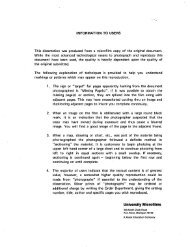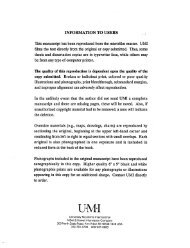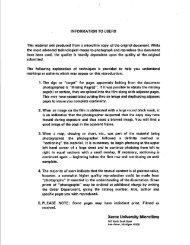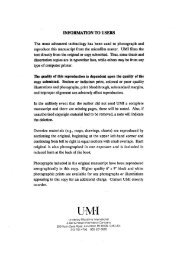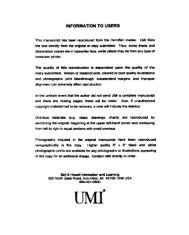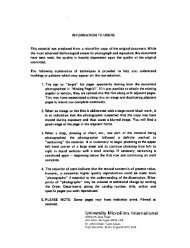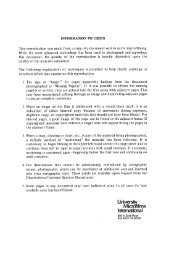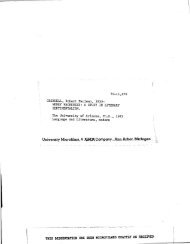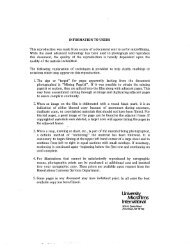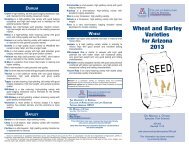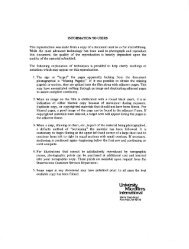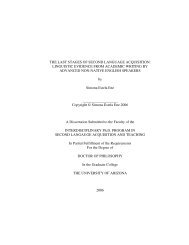- Page 1: INFORMATION TO USERS This manuscrip
- Page 4 and 5: UMI Number: 3031394 Copyright 2001
- Page 6 and 7: STATEMENT BY AUTHOR This dissertati
- Page 8 and 9: TABLE OF CONTENTS LIST OF ILLUSTRAT
- Page 10 and 11: TABLE OF CONTENTS - Conlinued Writi
- Page 12 and 13: TABLE OF CONTENTS - Continued Women
- Page 14 and 15: LIST OF ILLUSTRATIONS FIGURE 1, Cen
- Page 18 and 19: operationalized, and the contrastin
- Page 20 and 21: groceries, while walking behind the
- Page 22 and 23: Eric Wolf and William Roseberry. I
- Page 24 and 25: Chapter 5 (Serving and Spatsearen)
- Page 26 and 27: In concluding, I draw attention to
- Page 28 and 29: during August 1997. I then show how
- Page 30 and 31: point of departure. By stressing th
- Page 32 and 33: and other natural resources, as wel
- Page 34 and 35: The foundations of Anabaptist belie
- Page 36 and 37: people who were killed between 1524
- Page 38 and 39: eturn of Christ brought much confus
- Page 40 and 41: Working unceasingly, Menno Simons o
- Page 42 and 43: The etTorts around unifying opposin
- Page 44 and 45: marshes and many died of swamp feve
- Page 46 and 47: granted Mennonites recognition on a
- Page 48 and 49: Big sacrifices were made by both of
- Page 50 and 51: On the long trek to South Russia, M
- Page 52 and 53: hand-copied and transmitted from ge
- Page 54 and 55: The highest religious leaders, the
- Page 56 and 57: as peaceful as it might have seemed
- Page 58 and 59: autonomy. Their delegates to St. Pe
- Page 60 and 61: already resulted in separate groups
- Page 62 and 63: The recently arrived immigrants liv
- Page 64 and 65: solid landbase and village communit
- Page 66 and 67:
join the less conservative Berglhal
- Page 68 and 69:
prison. The troubled Old Colony mem
- Page 70 and 71:
Manitoba Old Colony members. This 1
- Page 72 and 73:
who among the conservatives had off
- Page 74 and 75:
sociopolitical upheavals, each of w
- Page 76 and 77:
development of two Mennonite school
- Page 78 and 79:
to select the village, the lot deci
- Page 80 and 81:
Besides suffering from droughts, th
- Page 82 and 83:
eventually had to comply. In Januar
- Page 84 and 85:
only fifteen years, the little trai
- Page 86 and 87:
While the external markets are male
- Page 88 and 89:
the implementation of good sanitati
- Page 90 and 91:
Excommunications are meant to induc
- Page 92 and 93:
equipment, such as threshing machin
- Page 94 and 95:
the exclusiveness of their way of l
- Page 96 and 97:
CHAPTER 2: Representations of "The
- Page 98 and 99:
exotic "otiier." In "Reading Nation
- Page 100 and 101:
their traditional material culture
- Page 102 and 103:
States Mennonite scholars to partic
- Page 104 and 105:
101 In a more recent study, Redekop
- Page 106 and 107:
1983; Toews et al. 1992) is sparse,
- Page 108 and 109:
about the celebration once in a whi
- Page 110 and 111:
Unser Hoffnungsheim^° as well as s
- Page 112 and 113:
109 the Mennonite migrations since
- Page 114 and 115:
all, the women attending the circle
- Page 116 and 117:
113 Celebrating 75 Years of Mennoni
- Page 118 and 119:
115 Everyone waited patiently for a
- Page 120 and 121:
117 quilts and stitched kitchen tow
- Page 122 and 123:
Those who stayed on the premises we
- Page 124 and 125:
121 The themes of thankfulness and
- Page 126 and 127:
longer allowed to own more than 200
- Page 128 and 129:
versucht, den Armen zu helfen, inde
- Page 130 and 131:
a thankful heart is good, because i
- Page 132 and 133:
129 worldwide. Some cooperation, ho
- Page 134 and 135:
13t The praise for the Mennonites b
- Page 136 and 137:
(from HG; my translation) tVir Menn
- Page 138 and 139:
135 Static definitions of group ide
- Page 140 and 141:
examines how nationalist re-present
- Page 142 and 143:
139 427). While the hegemonic disco
- Page 144 and 145:
solid land base and village communi
- Page 146 and 147:
to allow special privileges - even
- Page 148 and 149:
epresentations of their history and
- Page 150 and 151:
147 migration possible. More import
- Page 152 and 153:
149 The local Chihuahuan Mennonite
- Page 154 and 155:
15t The importance of uncovering wo
- Page 156 and 157:
15S The gender division of Mennonit
- Page 158 and 159:
women present during the anniversar
- Page 160 and 161:
casting is delineated in strong con
- Page 162 and 163:
In spite of the long pilgrimage all
- Page 164 and 165:
16t Of special mention in journalis
- Page 166 and 167:
16S German Consul Walter Schmiedeha
- Page 168 and 169:
165 Similarly. Mexican ramhos refle
- Page 170 and 171:
167 Instead of attempting to give a
- Page 172 and 173:
16» Mennonites. Besides laying out
- Page 174 and 175:
oth on the sidewalks and across the
- Page 176 and 177:
e important in Chihuahua, but apple
- Page 178 and 179:
175 Mennonites in 1922. Driving at
- Page 180 and 181:
who hold key positions between the
- Page 182 and 183:
17» Each of the bookstores offered
- Page 184 and 185:
181 First Impressions During the tw
- Page 186 and 187:
183 more successful in learning Spa
- Page 188 and 189:
addressed during the "lecture" whic
- Page 190 and 191:
187 trip to Cuauhtemoc with overnig
- Page 192 and 193:
While explaining my interests to wo
- Page 194 and 195:
the purpose of communicating while
- Page 196 and 197:
19a conservative church group? Or s
- Page 198 and 199:
195 The sample of 12 health care pr
- Page 200 and 201:
Enjoy with ham, Schmamtfal (LG; sau
- Page 202 and 203:
into their work aimed at supporting
- Page 204 and 205:
201 work in a total of 102 househol
- Page 206 and 207:
3.3. Writing Processes 2oa Epistemo
- Page 208 and 209:
20& In order to express respect for
- Page 210 and 211:
207 a researcher, but also because
- Page 212 and 213:
209 of representing an exotic "othe
- Page 214 and 215:
211 Mennonite groups in Chihuahua s
- Page 216 and 217:
2t3 While I became friends with som
- Page 218 and 219:
PART III: EVERYDAY LIFE: WOMEN'S WO
- Page 220 and 221:
217 Mennonite habitus simultaneousl
- Page 222 and 223:
219 show how they are located in wo
- Page 224 and 225:
surrounding each farm shows doors a
- Page 226 and 227:
223 Paul Redekop (1986:83) summariz
- Page 228 and 229:
225 engage in wage labor.^ In both
- Page 230 and 231:
227 labor of the kind stereotyped a
- Page 232 and 233:
Whether working at home, on the far
- Page 234 and 235:
church services and other Sunday ev
- Page 236 and 237:
233 The case studies lead the reade
- Page 238 and 239:
at play, works on crafts projects,
- Page 240 and 241:
Monday. June 8. 1998: Morning: I jo
- Page 242 and 243:
239 because milking by hand takes a
- Page 244 and 245:
of the traditional village schools
- Page 246 and 247:
we ate. I formed the butter, then p
- Page 248 and 249:
245 Helena Enns married Peter, one
- Page 250 and 251:
247 sisters come from a big family
- Page 252 and 253:
249 After eleven years of marriage,
- Page 254 and 255:
come home from school for lunch. Bo
- Page 256 and 257:
during the wori( (e.g.. healthy or
- Page 258 and 259:
255 with my baby: read to the child
- Page 260 and 261:
257 In general, housework is a soli
- Page 262 and 263:
Justina and her sister Helena were
- Page 264 and 265:
sharing their recipes with me. and
- Page 266 and 267:
and Monday is the traditional day f
- Page 268 and 269:
265 from traditional, homemade dres
- Page 270 and 271:
267 interesting feature of her gard
- Page 272 and 273:
269 looking fur. She also had taken
- Page 274 and 275:
calves that were waiting in small c
- Page 276 and 277:
27a left for work, because she was
- Page 278 and 279:
275 so that each task had its alloc
- Page 280 and 281:
277 yard cleaning. Women also bake
- Page 282 and 283:
279 seasonal periods (spring, summe
- Page 284 and 285:
281 beans and making lunch - bean s
- Page 286 and 287:
283 Besides sewing, Christmas time
- Page 288 and 289:
CHAPTER 5: Serving and Spatsearen^
- Page 290 and 291:
287 community rules continue to be
- Page 292 and 293:
Mennonite communities with a focus
- Page 294 and 295:
circles of related couples or frien
- Page 296 and 297:
293 Executive Committee). The Progr
- Page 298 and 299:
Lafiet um aber Gules tun und nicht
- Page 300 and 301:
297 while they talk quietly. Some o
- Page 302 and 303:
299 which mothers could bring peace
- Page 304 and 305:
301 Traditionally, visiting is the
- Page 306 and 307:
303 dishes plus sodas, coffee, and
- Page 308 and 309:
they saw what I had brought, they a
- Page 310 and 311:
307 An Easter Sunday at Anna Krahn'
- Page 312 and 313:
309 In mixed groups, the gender and
- Page 314 and 315:
311 In a society segmented along th
- Page 316 and 317:
at the same time. In the case of on
- Page 318 and 319:
the accompanying words do make a si
- Page 320 and 321:
Conference women and men. More gend
- Page 322 and 323:
old and more recent family pictures
- Page 324 and 325:
chisme may also serve as a means of
- Page 326 and 327:
323 concerns for health, detailed n
- Page 328 and 329:
325 The health of those Mennonites
- Page 330 and 331:
two years. ... in total, eighty-six
- Page 332 and 333:
329 thousand doses of vaccines alon
- Page 334 and 335:
331 As San Antonio's population beg
- Page 336 and 337:
Life expectancy [among Mennonites]
- Page 338 and 339:
There is no way of telling the exac
- Page 340 and 341:
She thought one has to watch those
- Page 342 and 343:
339 Health care seeking is influenc
- Page 344 and 345:
341 at and talking directly to the
- Page 346 and 347:
in these practices intended to prod
- Page 348 and 349:
345 management groups that transcen
- Page 350 and 351:
This approach to health in the Menn
- Page 352 and 353:
349 dynamics of women's own iiealth
- Page 354 and 355:
health promoting behavior. Some of
- Page 356 and 357:
medicines and plants. One fruit not
- Page 358 and 359:
355 before she noticed. Surely thei
- Page 360 and 361:
357 As the vaccination team works d
- Page 362 and 363:
solution. These explanations in spo
- Page 364 and 365:
pains. ... We also went to the phar
- Page 366 and 367:
ut realized that her seemingly simi
- Page 368 and 369:
365 Eghte Hieng-fong Essenz (deutsc
- Page 370 and 371:
her head and then her heart. The au
- Page 372 and 373:
Israel liebte Gurken " (HG; The Hea
- Page 374 and 375:
1996; Koblinsky et al 1993; Okojie
- Page 376 and 377:
The only local Mennonile doctor gav
- Page 378 and 379:
375 When I first visited the Mennon
- Page 380 and 381:
377 donn, no dree Moonalen. jing el
- Page 382 and 383:
379 childcare and housework (Bird a
- Page 384 and 385:
play classical tunes and also had a
- Page 386 and 387:
383 Once a woman is too sick to wor
- Page 388 and 389:
Finally she realized that she had t
- Page 390 and 391:
community member, who was suffering
- Page 392 and 393:
members because of the belief that
- Page 394 and 395:
etween conceptions of the healthy b
- Page 396 and 397:
Other studies have stressed that "n
- Page 398 and 399:
395 cope ... or a disease that can
- Page 400 and 401:
communication, and processes of hea
- Page 402 and 403:
strenuous human effort. The idea th
- Page 404 and 405:
401 indicating "health" to be part
- Page 406 and 407:
continued with her woric. because,
- Page 408 and 409:
405 focused on intra-congregational
- Page 410 and 411:
407 order to keep their patients. T
- Page 412 and 413:
409 As indicated above in the Menno
- Page 414 and 415:
411 lost to death decades after the
- Page 416 and 417:
413 Froese was the first to come to
- Page 418 and 419:
strengthen women's social positions
- Page 420 and 421:
417 Becoming a Mennonite woman enta
- Page 422 and 423:
419 mothers.* I divide this process
- Page 424 and 425:
421 screamed, umil her mother told
- Page 426 and 427:
early age come to see a gender divi
- Page 428 and 429:
425 skill's are in demand." A teach
- Page 430 and 431:
427 having their daughters around,
- Page 432 and 433:
preparing dinner. While we were con
- Page 434 and 435:
during the colder season, women wea
- Page 436 and 437:
elatives. Similarly. Old Colony tee
- Page 438 and 439:
436 houses, have coffee and cake, c
- Page 440 and 441:
437 Over the years, women's everyda
- Page 442 and 443:
439 "pregnancy" towards persons who
- Page 444 and 445:
441 As household compositions chang
- Page 446 and 447:
8. Social Challenges and Copine wit
- Page 448 and 449:
... there is reason to believe, on
- Page 450 and 451:
Funerals thus are ideal occasions f
- Page 452 and 453:
In addition to social struggle base
- Page 454 and 455:
Wealth is thus bad ethically only i
- Page 456 and 457:
the time or energy to take care of
- Page 458 and 459:
Owing that Mennonite women live in
- Page 460 and 461:
CONCLUSIONS Old Colony and General
- Page 462 and 463:
their accepted gender roles through
- Page 464 and 465:
In contrast to men, women are neith
- Page 466 and 467:
church community needs to be succes
- Page 468 and 469:
Mennonites, the interrelated concep
- Page 470 and 471:
Notably, the hands-on caring staff
- Page 472 and 473:
Questionnaire 1. Mennonite Women Ke
- Page 474 and 475:
(4) If you or a family member gets
- Page 476 and 477:
Questionnaire 2. Mennonite Nurses (
- Page 478 and 479:
APPENDIX B: PERMISSION
- Page 480 and 481:
APPENDIX C: ILLUSTRATIONS
- Page 482 and 483:
The MimtioiM of Mennonitei from the
- Page 484 and 485:
NORTH WESTERN EUROPE A CENTRE OF AN
- Page 486 and 487:
Bcfgradt Jchtmioov FIGURE 6, Migrat
- Page 488 and 489:
Livtrpool FltNCf G11««*» SWCWK)
- Page 490 and 491:
MENNONITE SETTLEMENTS IN MANITOBA 1
- Page 492 and 493:
MENNONITE COLONIES IN MEXICO wnnonn
- Page 494 and 495:
i 3 T ttDancni rm rm rm IndusUial a
- Page 496 and 497:
Households and Communities Mennonit
- Page 498 and 499:
COMMITTEES TOTAL FEMALE MALE COUPLE
- Page 500 and 501:
©T-W ®-rH I I I I ^ S3 1 ~r D 3 S
- Page 502 and 503:
Number Health Care Practitioner Eth
- Page 504 and 505:
Monday Thursday Sunday TABLE 5b, Wo
- Page 506 and 507:
7W^: Monday Wednesday Friday Sunday
- Page 508 and 509:
Women Men Children Total Problems 3
- Page 510 and 511:
APPENDIX E: PHOTOGRAPHS
- Page 512 and 513:
REFERENCES References - Articles. B
- Page 514 and 515:
Bourdieu, Pierre 1990 The Logic of
- Page 516 and 517:
513 Collier, George A. 1994 BASTA!
- Page 518 and 519:
Dyck, Isaak M. 1995a [1942?] Auswan
- Page 520 and 521:
Friedrich, Paul 1977 [1970] Agraria
- Page 522 and 523:
Irvine, J. 1982 The Creation of Ide
- Page 524 and 525:
Koblinsky, Marge, Oona M.R. Campbel
- Page 526 and 527:
Martens, Katherine and Heidi Harms,
- Page 528 and 529:
Nugent, Daniel 1994a Social Class a
- Page 530 and 531:
Rebhun, L. 1993 Nerves and Emotiona
- Page 532 and 533:
1986 Sie suchten eine Heimat - Deul
- Page 534 and 535:
Stavenhaven, Rodolfo 1970 Social As
- Page 536 and 537:
Whiteford, Linda 1993 Child and Mat
- Page 538 and 539:
Vol. 6. No. 17. September 3. 1997 V
- Page 540:
Unknown 1998 Unsere Heimgegangenen



